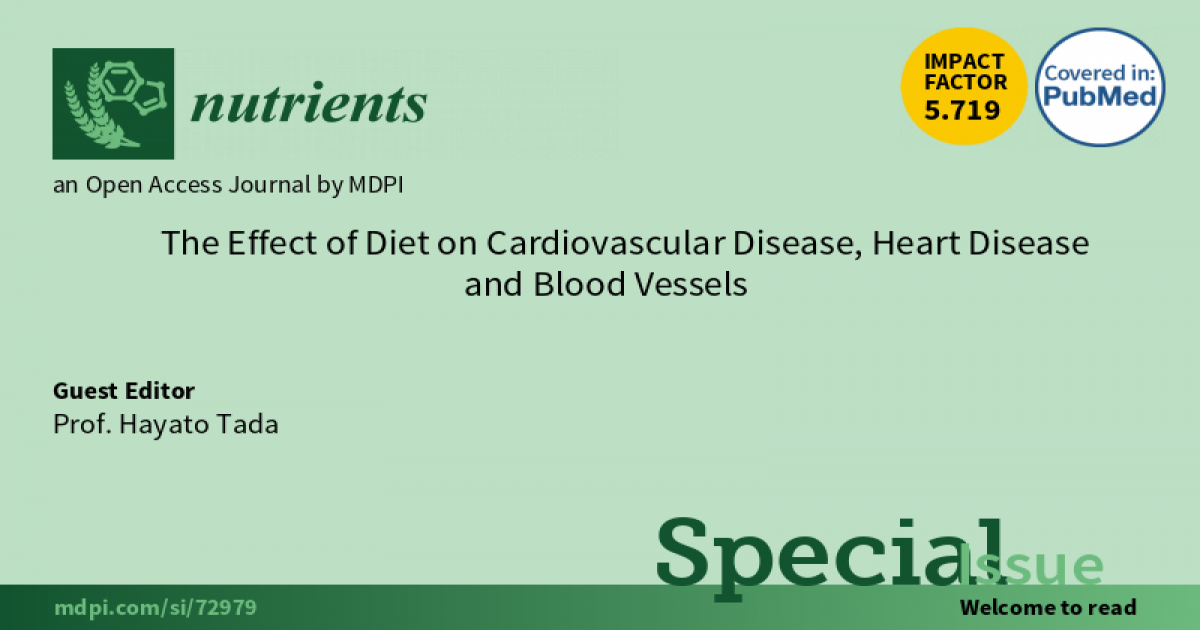- 5.0Impact Factor
- 9.1CiteScore
- 13 daysTime to First Decision
The Effect of Diet on Cardiovascular Disease, Heart Disease and Blood Vessels
This special issue belongs to the section “Nutritional Epidemiology“.
Special Issue Information
Dear Colleagues,
Appropriate lifestyle interventions, including nutrition, physical activity and exercise training, have been proposed as excellent potential candidates to prevent, slow, or even cure cardiovascular diseases. However, there are still so many open questions about the optimal intake of total energy and the distribution of macronutrients and micronutrients, and the appropriate exercise modality that is best suited or the most effective for heart diseases. In this special issue, we are accepting articles relating the effect of diet on cardiovascular disease, heart disease, and blood vessels. We request the submission of articles providing interesting data on the epidemiology, genetics, clinical trials, digestibility, bioaccessibility, metabolism, absorption, bioactivity, effect on microbiota, food matrix effect, and extreme case report relating this issue. Methodological studies of dietary and biomarker measurements in terms of their application in epidemiological studies are also welcomed. We encourage the scientific community to make significant and innovative contributions to enhance our knowledge of the effects of diet on “heart disease”.
Prof. Hayato Tada
Guest Editor
Manuscript Submission Information
Manuscripts should be submitted online at www.mdpi.com by registering and logging in to this website. Once you are registered, click here to go to the submission form. Manuscripts can be submitted until the deadline. All submissions that pass pre-check are peer-reviewed. Accepted papers will be published continuously in the journal (as soon as accepted) and will be listed together on the special issue website. Research articles, review articles as well as short communications are invited. For planned papers, a title and short abstract (about 250 words) can be sent to the Editorial Office for assessment.
Submitted manuscripts should not have been published previously, nor be under consideration for publication elsewhere (except conference proceedings papers). All manuscripts are thoroughly refereed through a single-blind peer-review process. A guide for authors and other relevant information for submission of manuscripts is available on the Instructions for Authors page. Nutrients is an international peer-reviewed open access semimonthly journal published by MDPI.
Please visit the Instructions for Authors page before submitting a manuscript. The Article Processing Charge (APC) for publication in this open access journal is 2900 CHF (Swiss Francs). Submitted papers should be well formatted and use good English. Authors may use MDPI's English editing service prior to publication or during author revisions.
Keywords
- Cardiovascular Disease
- Diet
- Fatty acid
- Sterols
- Heart Failure
- Blood Vessels
- Genetics
- Epidemiology
- Metabolism

Benefits of Publishing in a Special Issue
- Ease of navigation: Grouping papers by topic helps scholars navigate broad scope journals more efficiently.
- Greater discoverability: Special Issues support the reach and impact of scientific research. Articles in Special Issues are more discoverable and cited more frequently.
- Expansion of research network: Special Issues facilitate connections among authors, fostering scientific collaborations.
- External promotion: Articles in Special Issues are often promoted through the journal's social media, increasing their visibility.
- e-Book format: Special Issues with more than 10 articles can be published as dedicated e-books, ensuring wide and rapid dissemination.

